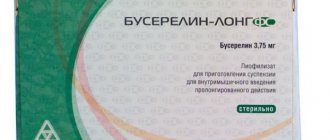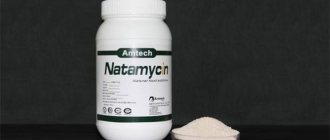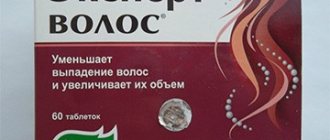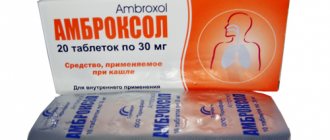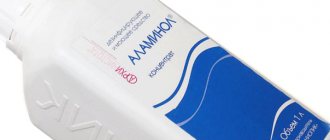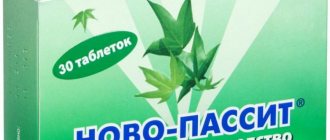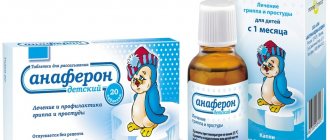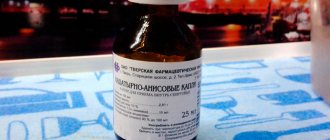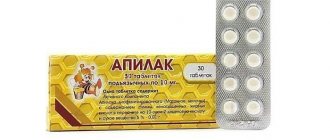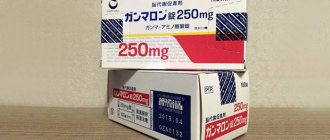Judging by the packaging of this drug, Rinza tablets help cope with the symptoms of a cold. This is true. Respiratory diseases and ARVI can be caught not only in the autumn-winter period, so it is important to know what can and should be taken if such an unfortunate event occurs.
It would be best to visit a doctor who will help you choose an effective symptomatic treatment for a cold. Why symptomatic? Fever, chills, temperature that creeps up, headache, runny and stuffy nose, cough, aches in muscles and joints are unpleasant symptoms of a cold. A common and tolerable ailment is best treated with rest, warm drinks and sleep. But when poor health does not allow you to live normally and affects the quality of life, a variety of drugs come to the rescue that remove unpleasant symptoms. Rinza is one of them. This is a combination medicine that helps fight the symptoms of a cold. It contains not one, but several active components.
Rinza contains the most paracetamol (500 mg). It has an analgesic and antipyretic effect. That is, it lowers the temperature, relieves headaches, sore throats and aching muscles and joints. With all this, the gastric mucosa is safe, because, unlike NSAIDs, paracetamol does not affect it.
Phenylephrine (10 mg) - this substance constricts blood vessels, which means swelling of the mucous membranes of the nasopharynx, nose and sinuses is reduced. Nasal congestion goes away.
Chlorphenamine (2 mg) also relieves swelling. This substance also has an antihistamine effect, which helps get rid of itching in the nose and eyes.
Caffeine (30 mg) among the components of Rinza improves the overall well-being of the patient. Fatigue and drowsiness disappear. Vitality increases. Also, caffeine enhances and accelerates the pain-relieving effect of paracetamol.
Description and composition
The drug is a combination drug, containing several ingredients.
This:
- Paracetamol (500 mg);
- Caffeine (30 mg);
- Chlorphenamine maleate (2 mg);
- Phenylephrine hydrochloride (10 mg).
The drug is available in the form of tablets, ten pieces in a blister.
Paracetamol has an antipyretic and analgesic effect. Caffeine stimulates the nervous system and immunity, enhances the effect of paracetamol. Chlorphenamine maleate has an antihistamine effect. Phenylephrine hydrochloride constricts blood vessels, producing an anti-edematous effect.
The medicine has the following actions:
- antipyretic;
- painkillers;
- antiallergic;
- decongestant;
- psychostimulant.
Rinza: effectiveness of the drug
The components of Rinza together give a positive effect in the fight against all colds. The main thing is not to miss the moment when the disease is just beginning to develop. Let's take a closer look at the effect of tablets on the patient's body:
- When the flu begins, pain appears in the muscles, throat, and headache. If these symptoms occur, it is recommended to take paracetamol. Moreover, the dosage of the drug should be in the range: 500-1000 mg . Rinza tablets usually contain 500 mg of this substance. One tablet is enough to get rid of discomfort.
- Viruses and bacteria have a negative effect in general; they poison the patient’s body. As a result, a person quickly gets tired, loses strength, and feels general malaise. Caffeine helps cope with these problems. Thanks to it, the patient feels an invigorating effect and strength is restored.
- Caffeine also has a diuretic effect . Therefore, the patient needs to drink as much water as possible. This helps flush out harmful bacteria and lower the temperature. And the vasodilating effect of caffeine helps eliminate discomfort in the nasopharynx.
- Another component - Phenylephrine serves to get rid of rhinitis and nasal congestion . It acts directly on blood vessels, reducing swelling of the upper respiratory tract. Helps to quickly cope with a runny nose that has not yet begun. Already on the second day you will breathe freely.
- Pheniramine (Chlorphenamine) is an antiallergic component. When a cold begins, a hormone such as histamine begins to transmit an impulse, thereby aggravating the development of the disease. Chlorphenamine acts on histamine as an antidote. It blocks its action. Prevents the development of allergic reactions in the form of swelling, rashes on the skin, itching, irritation of the mucous membranes and others. This substance eliminates swelling, constricts blood vessels and capillaries, prevents the formation of mucous secretions, and prevents the development of rhinitis and sore throat.
How to relieve cold symptoms using a rhinza?
Rinza contains optimal dosages of the listed components and therefore they successfully remove all manifestations of the first signs of influenza, acute respiratory infections, and acute respiratory viral infections. More precisely: nasal congestion, sore throat, headaches, increased body temperature, weakness, etc. The use of the drug has a beneficial effect on a person, helps to restore one’s strength in a short period of time, and not fall out of the work process. It is better to immediately stop the disease in a short time than to have to undergo treatment for a long time and buy many more expensive dosage forms.
What does Rinza treat?
The drug is prescribed for:
- cold;
- flu;
- ARVI;
- neuralgia;
- toothache;
- migraine;
- burns;
- traumatic pain;
- periodic female pain;
- acute sinusitis;
- rhinitis;
- pharyngitis.
The drug is used at the first signs of a cold (bone aches, headache, watery eyes). But it relieves nasal congestion quite well, thanks to its decongestant properties. Therefore, it is prescribed for rhinitis, sinusitis, and pharyngitis.
It is also sometimes used for burns, fractures, bruises, neuralgia, because it perfectly relieves pain.
Rinza, Rinzasip: how to take tablets for children?
These tablets can only be taken by teenagers from the age of fifteen . Standards for using the drug for young people: 1 tablet, 3 times a day . The course of treatment is five days .
Children are recommended to drink the powder dissolved in hot water - in the form of tea. The liquid should be pleasantly warm when consumed. The drug for children is called Rinzasip.
But it is also intended for children over six years old . Before this age, this drug is not allowed to be used by children in any form at all.
Dosages and schedule:
- For a single dose , just dissolve one packet in a cup of hot water (do not use boiling water for medicinal tea).
- Stir the solution and give it to the child to drink, only so that the liquid is not hot.
- For children from 6 to 10 years old, 2 doses per day are enough . And until the age of twelve - three times a day . Over 12 years - four doses per day .
- The interval between taking the product is about four to six hours.
- period is five days .
Rinza - for children against colds
The powder contains Vitamin C , so the drug restores the functioning of the immune system in children and adolescents. It is this vitamin that helps a weakened immune system cope with the disease in the early stages of its development, by accelerating metabolic processes. It is very noteworthy that ascorbic acid does not have the properties of accumulating excess in the body, so there cannot be an excess of it. During colds, the body always experiences a lack of this component, so it is necessary to replenish it.
Who should not take the drug
The medicine is contraindicated:
- with personal intolerance to substances;
- with severe renal failure;
- with liver failure;
- with Dubin-Johnson syndrome;
- for bronchial asthma;
- with severe hypertension;
- with severe atherosclerosis;
- for diabetes mellitus;
- for chronic lung diseases;
- with hyperthyroidism;
- for blood diseases;
- with anemia;
- with leukopenia;
- children under fifteen years of age;
- during pregnancy;
- for epilepsy;
- with prostate adenoma;
- with increased intraocular pressure;
- during lactation;
- with alcoholism;
- with sensitivity to xanthines.
Before starting treatment, you should definitely consult a doctor.
Indications and contraindications for the use of Rinz
The drug Rinza is often included in the complex treatment of colds and acute respiratory viral infections, where fever and pain are observed.
Significant contraindications include pronounced atherosclerosis, hypertension, and diabetes mellitus. The use of Rinz during pregnancy is unacceptable. In addition, one should not exclude the individual characteristics of each sick organism, sometimes expressed by intolerance to certain chemical elements. Rinza can be prescribed to children only in extreme cases.
Side effects
Sometimes during treatment with the drug, unpleasant symptoms may occur:
- heartburn;
- stomach ache;
- nausea, vomiting;
- constipation or diarrhea;
- increased liver enzymes;
- drop in blood glucose levels;
- hypertension;
- tachycardia, bradycardia;
- arrhythmia;
- dyspnea;
- pain in the heart;
- noise in ears;
- dizziness;
- migraine;
- anxiety;
- sleep disturbance;
- increased excitability;
- kidney inflammation;
- painful urination;
- difficulty passing urine;
- anemia;
- thrombocytopenia;
- dilated pupils;
- increased intraocular pressure;
- allergic rash;
- anaphylactic shock;
- hives;
- itching;
- Quincke's edema;
- Stephen-Jones syndrome.
If such symptoms appear, you should immediately stop taking the drug and consult your doctor.
Reviews
Numerous reviews about this drug left by patients and doctors are, in most cases, positive. There are virtually no reports of overdose cases.
Not everyone, of course, knows the indications for using Rinza tablets. Patients who have used this medication to eliminate cold symptoms note that the drug helps reduce the likelihood of developing the disease if such medications are taken when the first symptoms occur. At the same time, nasal congestion is quickly eliminated, soreness in the throat becomes less pronounced, and the elevated temperature decreases. At the height of the disease, according to patients, using this remedy can significantly alleviate the condition, which is characterized by fever and chills.
Overdose
If you accidentally or intentionally take too many tablets, you need to induce vomiting and take activated charcoal.
Overdose is expressed in the following manifestations:
- nausea;
- diarrhea;
- weakness;
- pale skin;
- pain under the right rib;
- increased sweating;
- yellowing of the whites of the eyes.
The analysis shows: high bilirubin, low prothrombin. If convulsions occur, you should take diazepam.
Sometimes fainting, heart failure and coma may occur.
Therefore, it is necessary to urgently call an ambulance.
Special Recommendations
When treating with this medication, it is recommended to refrain from drinking alcoholic beverages, sleeping pills and anxiolytic medications. This medicine should not be used in combination with other drugs that contain paracetamol: this may result in an overdose. During the period of therapy, it is necessary to refrain from driving and performing work that requires the patient to have a high concentration of attention and speed of psychomotor reactions of the body. Contraindications to the use of Rinza must be taken into account in advance.
Interaction
The drug should not be used together with other medications that contain phenylephrine, caffeine, or paracetamol. The medicine enhances the effect of beta blockers and MAO inhibitors. If taken together with antipsychotics and antidepressants, dry mouth and constipation may occur.
Paracetamol has a bad effect on the liver, especially if taken together with barbiturates, diphenin, carbamazepine, rifampicin. Barbiturates reduce the antipyretic effect of the drug. If you take Rinza together with guanthedine, your blood pressure may drop. And if you take Rinza and cardiac glycosides together, there is a risk of developing arthymia and heart attack.
Oral contraceptives enhance the effect of Rinza. If taken simultaneously with sedatives, their effect is reduced. Taking Rinza with nephrotoxic antibiotics is not recommended.
Rinza: composition, release form
In addition to the above components (paracetamol, caffeine), the tablets contain chlorphenamine, phenylephrine hydrochloride and such auxiliary components as:
- Starch, magnesium stearate, CMC (carboxymethyl starch), talc
- Preservative – E218, pink dye
- Enterosorbents
Substance release form: powder, tablets.
Remedy for the first symptoms of acute respiratory infections - Rinza
The manufacturer recommends storing the medicine in a dark place without high humidity. The temperature should be 25 degrees. Shelf life is no more than three years.
